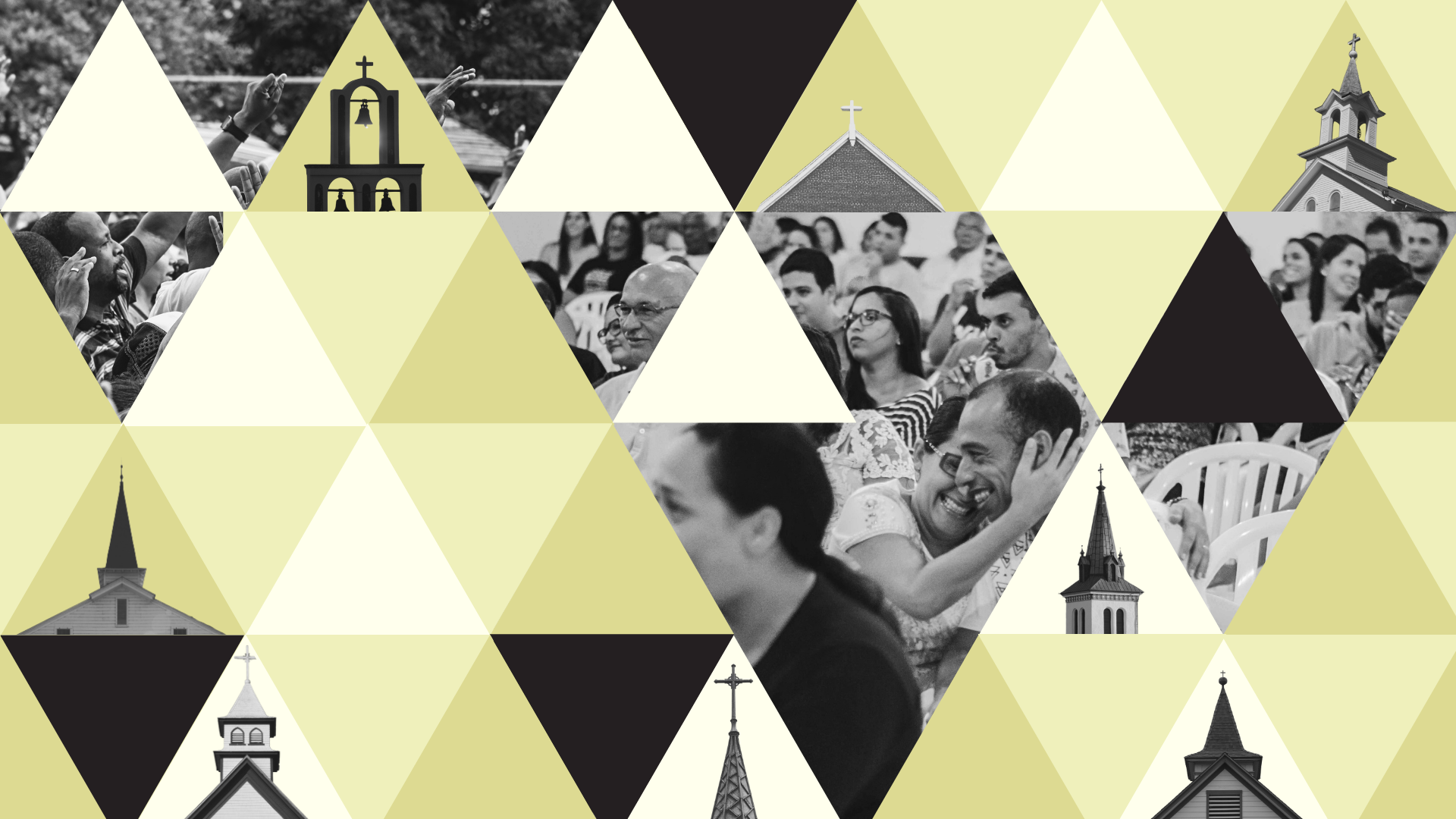Then Jesus came to them and said, ‘All authority in heaven and on earth has been given to me. Therefore go and make disciples of all nations, baptizing them in the name of the Father and of the Son and of the Holy Spirit, and teaching them to obey everything I have commanded you. And surely I am with you always, to the very end of the age.’
(Matthew 28:18–20)
Why we gather
Come this Sunday, hundreds of millions of Christians will converge all across the world in their local fellowship. ‘Going to church’ we often say. And the sheer variety of expressions, denominations, and liturgies is dizzying.
Perhaps, like my church, you enjoy coffee and cake before the service, lots of singing and Scripture reading before a sermon, then being commissioned to serve Christ throughout the week. We bolster this service with prayer meetings and a mid-week small group. Maybe your gathering is characterized by silence, smells and bells, formal confession, an extended Eucharist, and other sacraments to experience God’s empowering presence. For others, picture a drum-circle and dance, storytelling of how God is at work, inductive Bible study, and then being sent together to meet the needs of those in your wider community.
Whatever the form, wherever you meet—cathedral, warehouse, forest, or home— it’s worth stepping back and asking: Why do we gather? What binds all this activity together and makes it worthwhile, beyond being some ‘social club’ that meets civic needs?[1] How does the church serve the mission of God?

A Bigger Purpose
Sunday is, after all, the Lord’s day— a remembrance of Jesus’ life, death, and resurrection. ‘Church’ traces back to the Greek adjective, kuriakos, meaning ‘belonging to the Lord’ (cf. 1 Corinthians 11:20; Revelation 1:10). And the ‘church’ (ekklesia) Christ promised he would raise (Matthew 16:18) wasn’t an event nor a building, a programme nor a pastime, and definitely not a religious clique. Rather, it was a people called out and assembling together to represent Christ and his kingdom in word and deed, spreading his influence wherever they went, in and amongst every nation (ethnos) as distinct cultural groups populating the planet.[2]
The church is Christ’s ‘tangible kingdom’, by nature a missional people.[3] As they demonstrated and declared the glorious praises of God, who brought them out from darkness into light, they prepared the ground for Christ’s return, an advance witness of how the world would look when God sets everything right (1 Peter 2:9–12).
For in simplest terms, ‘the plural of disciple is church’
Following Jesus’ modeling, the aim of the Lord’s people wasn’t to get outsiders into the ecclesia. Rather, the aim of this gathering was to form people who were distinctively the Lord’s, 24–7: whatever you do, wherever you are, whoever you are. They gathered to scatter and serve the surrounding people with the love of God, announcing God’s reign and calling everyone to rethink and align with this new reality (Mark 1:14–15; Luke 4:18–19).[4] The church is the taster for the banquet, the trailer for the movie, a sign of life to come.[5] So, in short, every church, including your church, is God’s pilgrim people—a body of believers selected and sent by God to administer the kingdom and make Christ known by word and deed. We point not to ourselves, but to our Saviour and Lord.
And this purpose has huge implications for the way we gather, whatever the nature of your fellowship and wherever you meet. As the Rt. Rev and Assistant Bishop of York, Graham Cray, said, ‘Churches have to realize that the core of their calling is to be disciple-making communities, whatever else they do’.[6] For in simplest terms, ‘the plural of disciple is church’: not an institution, but the dynamic body of believers partnering together in God’s mission.[7] Or in Dietrich Bonhoeffer’s words, ‘the church is Christ existing as a community. . . . [It embodies] God’s new will and purpose for humanity.’[8]

Whole-life Disciples
So, core to the Lausanne Movement’s missional purposes is to envision and work toward a world in which there are disciple-making churches for every people and place.
Formulations abound. Most recently, popular author and pastor, John Mark Comer—drawing on Jesus calling the twelve in Mark 3:13–15—defines discipleship as practising the way of Jesus: Be with Jesus. Become like him. Do as he did.[9] He would have us ask questions like ‘What would Jesus do, if he were me?’
At the London Institute for Contemporary Christianity (LICC), we speak of being a ‘whole-life disciple’ as someone who is learning to follow the way of Jesus in their place at this time. While we’re all called to follow the same Lord, no two disciples are identical as the context in which we’re called is distinct—especially in the places you live and learn, work and play, shop and serve.
Disciples are life-long learners, sticking close to their Saviour and listening to how the word of God relates to the world in which they exist, encouraging one another to grow more like Christ in everyday life.
Disciples are life-long learners, sticking close to their Saviour and listening to how the word of God relates to the world in which they exist, encouraging one another to grow more like Christ in everyday life. We teach and learn together in a community of practice, apprenticed to the way of Jesus as we mature in head (wisdom), heart (virtue), and hands (skill)—becoming ‘wise peacemakers’ who know what makes for flourishing, wanting to work for shalom starting where we stand (Matthew 5:9; 10:16).[10]
And the calling of church-paid workers isn’t to mobilize more of your time to support their mission initiatives using your leisure time.[11] Rather, Christ gave us church leaders to ‘equip his people for works of service, so that the body of Christ may be built up’ as mature disciples (Ephesians 4:11–13). As Lesslie Newbigin argues, ‘The major role of the church in relation to the great issues of justice and peace . . . will be in its continual nourishing and sustaining men and women who will act responsibly as believers in the course of their secular duties as citizens.’[12]
Imagine, then, what a difference this would make in global mission if forming whole-life disciples was our reason for being, the top priority of every church.[13] What if we gave our all to shaping people in every place to look like Jesus—on their missional frontlines across the week—having kingdom impact in every sphere of society?

The Logic of Church
This is the missional logic of the church. Gathering is not a spectator sport, coming to consume a religious ‘service’. Rather, it’s more like a gym session with a personal trainer.[14] Every action when we gather is exercise to become more Christlike as we’re sent together and scatter to the office, the university, the local café, the mum’s group—‘here to be light, bringing out the God-colors in the world’ (Matthew 5:13–16, MSG).
Gathering is not a spectator sport
The whole liturgy when assembled together—the call to worship, greeting, song, Scripture reading, confession and assurance of pardon, baptism, creeds, prayer, sermons, communion, offering, and sending—is intended to form our minds, direct our hearts, and strengthen our hands to desire Christ and his kingdom, living for him everywhere we go.[15] Take, for instance, the Lord’s table. When we exercise well on Sunday, we become open to Christ’s faithful presence at work in our lives. So this practice moves outwards as we’re sent together, hosting our neighbours in grace-filled ways when we can set the table, but also recognizing and encouraging expressions of hospitality from people of peace in communities beyond the Sunday gathering as the church scattered (Luke 10:1–11).[16]

The Great Omission?
Unfortunately, it would seem that we’ve been busy with almost everything but disciple-making when the church gathers in its various expressions. In Dallas Willard’s memorable phrase, disciple-making has become ‘The Great Omission’.[17] It’s not an overstatement to say there is a ‘crisis’ of discipleship across much of the global church, losing our primary focus, often seeking to make ‘converts’ and integrate people into church events, ‘assuming new Christians will just get on with it’.[18]
we must prioritize life-on-life formation as we learn together to follow Christ in a broken world, especially in and through our occupations.
Having consulted across every region and issue network, intergenerationally, with thousands of hours of listening calls, the Lausanne Movement found that the most commonly identified need for the global church was discipleship that goes beyond evangelism, but in turn fuels mission and outreach.[19] Even when we do ‘discipleship’, it is typically located within and focused upon church gatherings and parachurch/cross-cultural missions, rather than starting where most Christians already are in their everyday life of work, rest, and play. The rise of digital technology may help with the disembodied transfer of knowledge, but we must prioritize life-on-life formation as we learn together to follow Christ in a broken world, especially in and through our occupations. We must get back to basics, for disciple-making is the foundation for integral mission and the first responsibility of the church.
Proving Christ Right
So, was Christ right? Is disciple-making truly the heartbeat of global mission, the call of the church, and the vehicle to live and share the reign of God among every people in every place? Is this your priority, particularly in your local fellowship? Simple one-degree shifts in church culture can re-center why we gather: cast a whole-life vision; focus on the frontline; shift from pastoral care to pastoral equipping; share stories of how God is at work in everyday life . . . the biggest issue is not our imagination, but our will. Is this what we truly want?

As we journey to and beyond the Fourth Lausanne Congress, I pray that as we go, we make disciples of all the nations, bringing them into the obedience of Christ as a tangible kingdom experienced everywhere we set our feet.
As Bryn Gillette so powerfully captured in his painting (see alongside) depicting this Lausanne pillar, only by Spirit-filled disciple-making will the church become this spotless bride prepared for her returning bridegroom, Christ. This is a planetary vision, carrying the flame into every country with the beauty of holiness; reflecting Christ’s own humility, integrity, and simplicity[20] that draws people from every tribe, tongue, and nation. For we are the Lord’s. And he alone is worthy. Prayerfully, then, may we build disciple-making churches for every people and place, so that we can demonstrate and declare Christ together— a whole church taking the whole gospel to the whole world.
Endnotes
- Emmanuel Ogamdi, ‘Have Churches Become Just Another Social Gathering?’ Medium, June 22, 2023.
- See the 2010 Lausanne Covenant, section A9, ‘We love the people of God’: ‘Jesus calls all his disciples together to be one family among the nations, a reconciled fellowship in which all sinful barriers are broken down through his reconciling grace. This church is a community of grace, obedience and love in the communion of the Holy Spirit, in which the glorious attributes of God and gracious characteristics of Christ are reflected and God’s multi-colored wisdom is displayed. As the most vivid present expression of the kingdom of God, the church is the community of the reconciled who no longer live for themselves, but for the Saviour who loved them and gave himself for them.’
- Hugh Halter and Matt Smay, The Tangible Kingdom: Creating Incarnational Community (Jossey-Bass, 2008). See also Rei Lemuel Crizaldo, ‘Missional People: A Sabbatical, Sent-out, and Sustained Community,’ Lausanne Blog, December 19, 2023; Christopher Wright, The Great Story and the Great Commission: Participating in the Biblical Drama of Mission (Baker Academic, 2024), 60–86. Inherent within The Great Commission are three reinforcing points of mission: building the church; serving society; and caring for creation. Building the church is ‘through evangelism and teaching; bringing individual sinners to repentance, faith, baptism, and obedience as disciples of Jesus Christ; and building them up to maturity in the fellowship of God’s holy people.’
- Neil Hudson, Scattered & Gathered: Equipping Disciples for the Frontline (IVP, 2019).
- Lesslie Newbigin, ‘On Being the Church for the World’, in Giles Ecclestone (ed.), The Parish Church (Mowbray, 1988), 37–38.
- Shared at an LICC event in London, 2011. For more, see his book, Disciples and Citizens: A Vision for Distinctive Living (IVP, 2007).
- Ross Hastings, ‘Vocation from Union with Christ: Overcoming Dualisms in the Calling of the Church’, The Regent World, iss. 33, no. 1 (April 20, 2021). See also Lesslie Newbigin, The Gospel in a Pluralist Society (Eerdmans, 1989), 227–228.
- Dietrich Bonhoeffer, Sanctorum Communio (Fortress Press, 2009), 199, 141. See also the Lausanne Covenant, article 6: ‘The church is the community of God’s people rather than an institution, and must not be identified with any particular culture, social or political system, or human ideology.’
- John Mark Comer, Practicing the Way: Be With Jesus, Become Like Him, Do as He Did (Form, 2024).
- Being a ‘wise dove’ was prized in the ancient church as the best witness to a bemused pagan world. For example, the 3rd-Century discipleship manual Didascalia Apostolorum (The Teaching of the Apostles) was designed to help reform pagans who committed to follow the way of Jesus but were now facing persecution for this costly decision. It gives us a picture of real Christians dedicating their everyday actions to Christ, imitating his teaching with patience. They were commended as being ‘like wise doves, at peace with one another, striving to fill the church’. See Alan Kreider, The Patient Ferment of the Early Church: The Improbable Rise of Christianity in the Roman Empire (Grand Rapids, MI: Baker Academic, 2016), 223–242.
- Mark Greene, at the 2010 Third Lausanne Congress on World Evangelization critiqued this primary mission strategy of the church, which seemed to be: ‘To recruit the people of God to give up some of their leisure time to support the mission initiatives of church-paid workers.’ See his manifesto, ‘The Great Divide’, online here.
- Lesslie Newbigin, The Gospel in a Pluralist Society (SPCK, 1989), 139.
- Neil Hudson, Imagine Church: Releasing Whole Life Disciples (IVP, 2012). See also core LICC publications toward this end, such as ‘Frontline Sundays’, ‘Leading a Whole-Life disciple-making Church’, ‘Sustaining Whole-Life disciple-making Church’, and more to support whole-life disciple-making churches.
- David Benson, ‘A Litany of Practices,’ Practical Theology vol. 12, iss. 3 (2019), 253–256. For examples of such practices, see here.
- James K. A. Smith, Desiring the Kingdom: Worship, Worldview, and Cultural Formation (Baker Academic, 2009), 155–215. See also Lausanne’s Manila Manifesto, section B8 on ‘The Local Church’: ‘The church is thus both a worshipping and a witnessing community gathered and scattered, called and sent. Worship and witness are inseparable.’
- See the work of David Fitch with his ‘7 Practices for the Church on Mission’, outlined in most detail in his book, Faithful Presence: Seven Disciplines that Shape the Church for Mission (IVP, 2016), explored here.
- Dallas Willard, The Great Omission: Reclaiming Jesus’s Essential Teachings on Discipleship (Monarch Books, 2006).
- Lucy Peppiatt, The Disciple: On Becoming Truly Human (Cascade Books, 2012), 12.
- See Global Listening Team, ‘Analysis of Lausanne 4 Listening Calls,’ Lausanne Movement (2023), 5–6, 13, 32–33, 59, 66. 20. See the 2010 Lausanne Covenant, section IIE.

